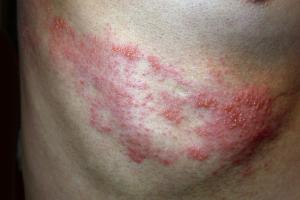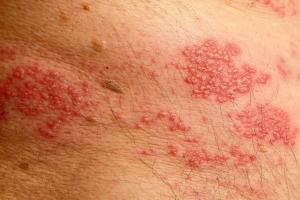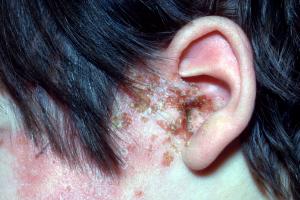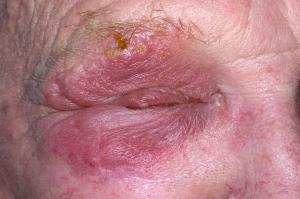Shingles
Shingles is an infection of a nerve and the skin around it. It's caused by the varicella-zoster virus, which also causes chickenpox. You can get shingles at any age but the risk and severity of shingles increases with age.
Symptoms of shingles
The main symptom of shingles is pain, followed by a rash that develops into itchy blisters.
It usually affects an area on one side of the body. It doesn’t cross the body's midline, an imaginary line running down from between the eyes.
Shingles can affect any part of your body including your face and eyes, but the chest and tummy are the most common areas.
Rash
During an episode of shingles, there is a painful rash lasting between seven and ten days. When you have shingles:
- new blisters may appear for up to a week, but a few days after appearing blisters become yellow, flatten and dry out
- scabs form where the blisters were, which may leave scarring
- the pain may be a constant, dull or burning sensation and its intensity can vary from mild to severe
- you may have sharp stabbing pains from time to time, and the affected area of skin will usually be tender




Sometimes shingles may cause early symptoms that develop a few days before the painful rash appears.
These early symptoms can include:
- burning, tingling, numbness or itchiness of the skin in the affected area
- a feeling of being generally unwell
- a high temperature
- muscle aches
- headache
When to get medical advice
Shingles isn't usually serious.
Contact your GP as soon as you recognise the symptoms. They'll diagnose shingles based on your symptoms and the appearance of the rash.
Early treatment can reduce the severity of your symptoms and the risk of developing complications.
Referral to hospital
You don't usually need hospital treatment for shingles.
Your GP may consider specialist advice if:
- they suspect a complication of shingles, such as meningitis or encephalitis
- shingles is affecting one of your eyes – there's a risk you could develop permanent vision problems if the condition isn't treated quickly
- a diagnosis isn't certain
- you have a persistent case of shingles that's not responding to treatment
- you've been diagnosed with the condition more than twice
- you're pregnant
- you have a weakened immune system – particularly in severe cases or cases affecting children
Treating shingles
There's no cure for shingles, but treatment can relieve symptoms until the condition resolves.
Treatment can include:
- covering the rash with clothing or a non-stick dressing to reduce the risk of other people becoming infected with chickenpox, as it's very difficult to pass the virus on to someone else if the rash is covered
- taking painkillers, such as paracetamol, ibuprofen* or codeine in combination with paracetamol
- antiviral medication to stop the virus multiplying, but not everyone needs this
- prescription painkilling medicine allowed by your GP if the pain is severe
*You should avoid giving ibuprofen to children with shingles.
Antiviral medication
Some people may need to take antiviral tablets.
A GP can prescribe antivirals.
An antiviral is suitable if you're aged 50 or older, within 72 hours of rash onset, to reduce the pain and severity of the episode.
If you're under 50, you may need antivirals if:
- an eye is affected
- your immune system is impaired
- the affected area is on the neck, limbs, or perineum (the area between your anus and genitals)
- your symptoms are very severe
- you are pregnant
Children with a normal immune system don't usually take antiviral medication.
If your child has a weakened immune system, they will need admission to hospital for intravenous antiviral medication.
Chickenpox and shingles
Most people get chickenpox in childhood. After the illness, the varicella-zoster virus remains dormant in the nervous system.
The immune system keeps the virus in check. Later in life, the virus can reactivate and cause shingles.
You can have shingles more than once, but it's very rare to get it more than twice.
Shingles virus reactivating
There isn't an exact cause to explain the shingles virus reactivating later in life.
Most cases of shingles seem to be caused by having lowered immunity.
This may be due to:
- age - shingles most commonly occurs in people aged over 70 - as you age, your immunity decreases
- physical and emotional stress – your body releases chemicals when you're stressed which can prevent your immune system working properly
- HIV and AIDS – people with HIV have a weakened immune system
- having a bone marrow transplant recently – the conditioning you require before the transplant weakens your immune system
- having an organ transplant recently – you may need to take medication to suppress your immune system, so your body accepts the donated organ
- chemotherapy – can temporarily weaken your immune system
Having some long term health conditions can also increase your risk of developing shingles, for example:
Young people who appear to be healthy can sometimes develop shingles.
Is shingles contagious
You cannot get shingles from someone else or from someone with chickenpox.
But you can catch chickenpox from someone with shingles if you haven't had chickenpox before.
The blisters in the shingles rash contain live virus.
If you haven't had chickenpox and make direct contact with an open blister or fluid, you can catch the virus and develop chickenpox.
Preventing the spread of the virus
If you have shingles, you're contagious until the last blister has dried and scabbed. To help prevent passing on the virus:
- don't share towels or flannels
- don't swim or play contact sports
You should also avoid work or school if your rash oozes fluid and can't be covered.
Complications with chickenpox
Chickenpox can be dangerous to certain people.
If you have shingles, avoid:
- women who are pregnant and haven't had chickenpox before as they could catch it from you, which may harm their unborn baby
- people who have a weak immune system, such as someone with HIV or AIDS
- babies under one month old, unless they're your baby, in which case they should have antibodies to protect them from the virus
Post-herpetic neuralgia
Shingles can sometimes lead to post-herpetic neuralgia.
This is severe burning, throbbing or stabbing nerve pain which last several months or longer after the shingles rash has gone.
It is a very painful condition usually affecting elderly people or people with a weakened immune system.
Ophthalmic shingles
Ophthalmic shingles affects one of the eyes. This occurs when the virus is reactivated in part of the trigeminal nerve, a nerve that controls sensation and movement in your face.
You should contact your GP if you have:
- a rash over your forehead, nose and around your eye
- conjunctivitis – inflammation of your eye that causes it to become red and watery with a sticky coating on your eyelashes
- a red eye
- problems with your vision
Shingles vaccination
Getting the shingles vaccine can reduce your chances of developing the condition.
More useful links
The information on this page has been adapted from original content from the NHS website.
For further information see terms and conditions.